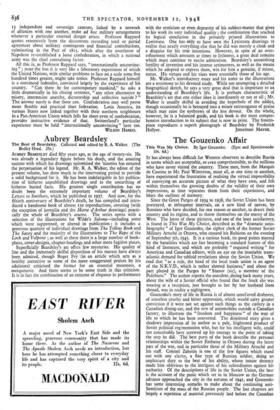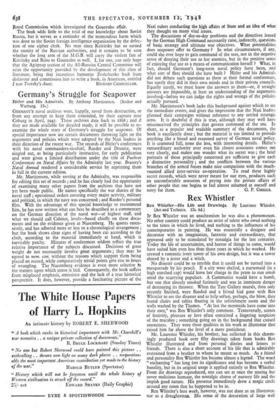The Gouzenko Affair
This Was My Choice. 10s. 6d.) By Igor Gouzenko. (Eyre and Spottiswoode• IT has always been difficult for Western observers to describe Russia in terms which are acceptable, or even comprehensible, to the millions who have never visited the country. These men, from the Marquis de Custine to Mr. Paul Winterton, must all, at one time or another, have experienced the frustration of realising the virtual impossibility of conveying an accurate picture of what they have seen, and felt within themselves the growing doubts of the validity of their own impressions, as time separates them from their experiences, and blurs the outlines of memory.
Since the Great Purges of 1934 to 1938, the Soviet Union has been portrayed, at infrequent intervals, on a new kind of ganvas by Russians who have decided, for one reason or another, to desert ;heir country and its regime, and to throw themselves on the mercy of the West. The latest of these pictures, and one of the least satisfactory, is found in This Was My Choice, described as the "dramatic auto- biography" of Igor Gouzenko, the cipher clerk of the former Soviet Military Attaché in Ottawa, who crossed his Rubicon on the evening of September 5th, 1945. It is a curious book, its good points marred by the banalities which are fast becoming a standard feature of this kind of literature, and which are probably " required writing " for American and Canadian editors, with an eye on the insatiable trans- atlantic demand for tabloid revelations about the Soviet Union. We read that " as a rule, the head of the local trade union is an agent of the N.K.V.D., which is rather 'shrewd business," and about the part played in the Purges by " Standv (sic), a member of the Politburo." The author repeats the anecdote, dating back many years, about the wife of a Soviet official who found that the frock she was wearing at a reception, just brought to her by her husband from abroad, was in reality a nightgown. Gouzenko's story of life in Russia is of almost =reeved' drabness, of senseless cruelty and bitter oppression, which would carry greater conviction if it were not set against such things as the cutlery in a Canadian dining-car, and the row of automobiles outside a -Canadian factory, to illustrate the " freedom and happiness " of the way of life to which he has been converted. The disjointed story gives a shadowy impression of its author as a pale frightened product of Soviet political regimentation who, but for his intelligent wife, could not conceivably have screwed up his courage to the point of taking the step he did. The best parts of the book describe the personal relationships within the Soviet Embassy in Ottawa during the latter part of the war, and in particular those of the. Military Attache and his staff. Colonel Zabotin is one of the few figures which stand out with any clarity, a fine type of Russian soldier, doing an unpleasant duty to the best of his ability, whose innate decency made him oblivious to the intrigues of his subordinates against his authority. Of the deicriptions of life in the Soviet Union, the best is the account of the panic which set in in Moscow as the German advance approached the city in the auramn of 1941, and Gouzenko has some interesting remarks to make about the continuing anti- Semitism of the mass of the Russian people. The last chapters are largely a repetition of material previously laid before the Canadian
Royal Commission which investigated the Gouzenko affair.
The book adds little to the total of our knowledge about Soviet Russia, but it serves as a reminder of the tremendous harm which was done to the Soviet foreign intelligence organisation by the defec- tion of one cipher clerk. No man since Krivitsky has so earned the enmity of the Russian authorities, and it remains to be seen whether the long arm of the M.G.B. will carry the violent fate of Krivitsky and Reiss to Gouzenko as well. I, for one, can only hope that the Agitprop section of the All-Russian Central Committee will seize the opportunity provided by the development of this class of literature, bring that incautious humorist Zoshchenko back from disfavour and commission him to write a book, in American, entitled



































 Previous page
Previous page